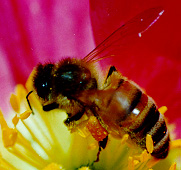| - An organization of herbalist and concerned people who are actively taking steps to raise awareness of the steady harvesting and habitat destruction that is placing many of our wild native herbs at risk for disappearence/extinction, popular herbs like golden seal, ginseng, echinacea. They sponser community replanting projects around the country. UpS is in the process of establishing a network of privatly owned botanical sanctuaries around the country, to serve as rich depositories for at risk plants (see the list below), and as educational and research centers for plant conservation and organic cultivation. To find out more about the benifits of botanical santuaries, United Plant Savers and how you can help visit please their web site. |
| At Risk List These plants are in danger of being harvested to extinction. We can help slow their disappearance from the wild by choosing whenever possible a substitute plant with similar benefits and uses. | To Watch List The populations of these plants are becoming increasingly rare and it is only a matter of time before they join their bethen in the at risk list. But we can help prevent this from happening by being aware. |
| American Ginseng (Panax quinquefolius) | Arnica (Arnica spp.) |
| Black Cohosh (Cimicifuga racemosa) | Butterfly Weed (Asclepias tuberosa) |
| Bloodroot (Sanguinaria canadensis) | Calamus (Acorus calamus) |
| Blue Cohosh (Caulophyllum thalictroides) | Chaparro (Casatela emoryi) |
| Echinacea (Echinacea spp.) | Elehpant Tree (Bursera microphylla) |
| Goldneseal (Hydrastis canadensis) | Eyebright (Euphrasia spp.) |
| Helonias Root or False Unicorn Rt (Chamaelirium luteum) | Gentian (Gentiana spp) |
| Kava Kava (Piper methysticum) (Hawaii only) | Goldthread (Coptis spp.) |
| Lady Slipper Orchid (Cypripeduim spp.) | Lobelia (Lobelia spp.) |
| Lomatium (Lomatium dissectum) | Maidenhair Fern (Adiaantum pendatum) |
| Osha (Ligusticum porteri, L. spp.) | Mayapple (Podophyllum petatum) |
| Partridge Berry (Mitchella repens) | Oregon Grape (Mahonia spp.) |
| Peyote (Lophohora williamsii) | Pink Root (Spigelia marilaandica) |
| Slippery Elm (Ulmus rubra) | Pipsissewa (Chimaphila umbellata) |
| Sundew (Drosera spp.) | Spikenard (Aralia racemosa, A. californica) |
| Trullium, Beth Root (Trillium spp.) | Stone Root (Collinsonia canadensis) |
| True Unicorn (Aletris farinosa) | Stream Orchid (Epipactis gigantea) |
| Venus' Fly Trap (Dionaea muscipula) | Turkey Corn (Dicentra canadensis) |
| Wild Yam (Dioscorea villosa, D. spp.) | Virginia Snakeroot (Aristolochia serpentaria) |
| White Sage (Salvia apiana) | |
| Yerba Mansa (Anemopsis californica) | |
| Yerba Santa (Eriodictyon californica) |
 Bee populations are declining all across the country and possibly the world. (I need to do more research.) The decline is due in part to a parasitic mite which kills the bees and from use of pesticides. So please refrain from using herbacides on your dandelions, or pesticides of any kind. To find out more about bees visit these links.
Bee populations are declining all across the country and possibly the world. (I need to do more research.) The decline is due in part to a parasitic mite which kills the bees and from use of pesticides. So please refrain from using herbacides on your dandelions, or pesticides of any kind. To find out more about bees visit these links.
